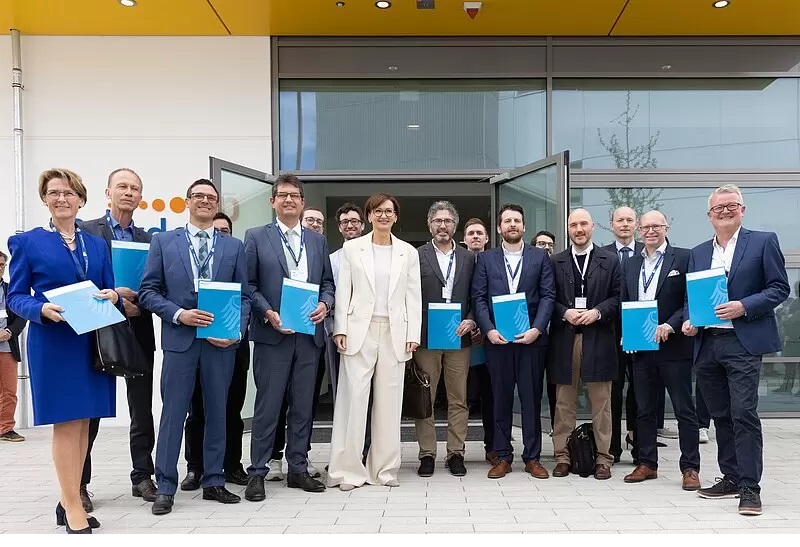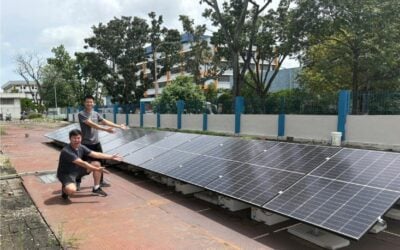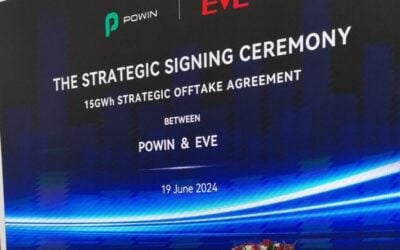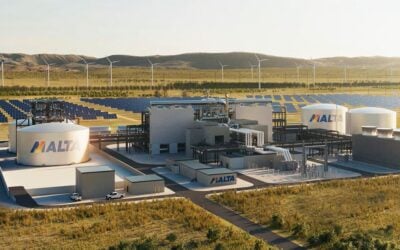
Here’s news in brief from around the world in energy storage with liquid metal battery maker Ambri, a German government-funded sodium-ion initiative, and ESS Inc’s iron flow battery project at Amsterdam airport.
Ambri files for Chapter 11 ahead of sale
Liquid metal battery startup Ambri has filed for Chapter 11 bankruptcy protection in the US before a proposed sale of its assets to the company’s lenders.
Enjoy 12 months of exclusive analysis
- Regular insight and analysis of the industry’s biggest developments
- In-depth interviews with the industry’s leading figures
- Annual digital subscription to the PV Tech Power journal
- Discounts on Solar Media’s portfolio of events, in-person and virtual
Ambri has been commercialising a high-temperature battery technology based around liquid calcium anodes and molten salt electrolyte, with solid antimony particles in the cathode since 2010.
It claims the materials used in its battery are abundant and that the tech can cost-effectively serve long-duration energy storage (LDES) applications.
According to filings with the US Bankruptcy Court for the District of Delaware, its decision to make the Chapter 11 declaration was taken at a special meeting of the company’s board on 3 May 2024.
Ambri’s lenders include Gates Frontier, the venture capital (VC) arm of Microsoft co-founder Bill Gates’ eponymous foundation, private investment firm Paulson Partners, and India’s Reliance Industries, which invested in the company in 2022.
Reliance is also among a number of partners that have agreed to pilot the Ambri liquid metal technology, along with US utility company Xcel Energy in Colorado, and Microsoft for a US data centre project.
Ambri said it has received financing commitments from its lender consortium and expects the sale process to be approved in July this year.
Varta leads German government-funded Na-ion consortium
The German Federal Ministry of Research and Education (BMBF) has approved funding for a consortium on sodium-ion (Na-ion) batteries for energy storage applications.
The consortium of 15 companies and universities will research and develop sodium-ion batteries, aiming to develop high-performance, environmentally friendly cells which can be produced on an industrial scale.
It is being led by German battery manufacturer Varta, which initiated the effort. The company has also been appointed as its coordinator, with the project scheduled to start at the beginning of June.
Bettina Stark-Watzinger, federal minister for research, handed over official documents to mark the ministry’s approval of around €7.5 million (US$8.07 million) in funding last Thursday (2 May).
“In order to further advance the future of decentralised energy storage and use, other innovative and powerful storage technologies are needed in addition to lithium-ion technology,” Varta CTO Rainer Hald said.
“In addition to existing technologies, sodium-ion batteries can make an important, sustainable contribution to the decarbonisation and electrification of many areas in order to actively shape the energy and mobility transition.”
The event followed the minister’s attendance a couple of days previously at an event to break ground on the Fraunhofer Research Institution’s FFB Battery Cell Production centre in Münster, western Germany.
FFB will “test innovative battery technologies as well as develop novel battery cell concepts and efficiently bring them to market maturity,” Stark-Watzinger said. Ministry BMBF will put €500 million into the development of the FFB facility.
ESS Inc commissions flow battery project at Amsterdam’s Schiphol airport
Iron electrolyte flow battery maker ESS Inc has commissioned the first planned phase of an energy storage project at Amsterdam Airport Schiphol, the Netherlands.
The flow battery system will help reduce reliance on diesel fuel for powering ground operations at the international airport. Ground power units that burn diesel to provide electrical power to parked stationary aircraft will instead be replaced with so-called Electric Ground Power Units (E-GPUs).
US-headquartered ESS Inc holds the IP for the flow battery technology behind these E-GPUs. Although the sizing, capacity, and storage duration of the Schiphol project have not been disclosed, the tech company said in January 2023, as the project was announced, that it would utilise ESS Inc Energy Warehouse units, each of which is 75kW output with 400kWh max capacity.
The airport installation is part of a wider European Union (EU) project called TULIPS to develop innovative low-carbon mobility and aviation solutions. The EU is backing TULIPS with €25 million funding. When the project was awarded early last year, ESS Inc. said its long-duration energy storage (LDES) solution’s safety and sustainability profiles were key to its selection.






